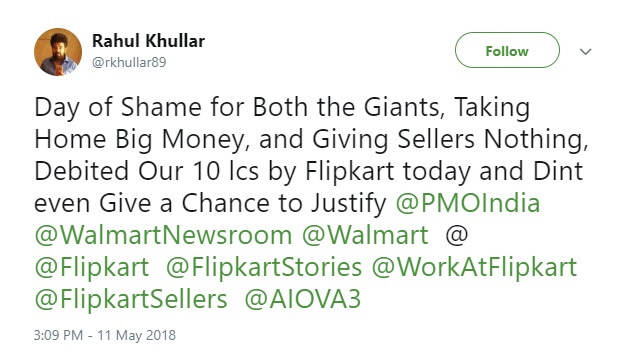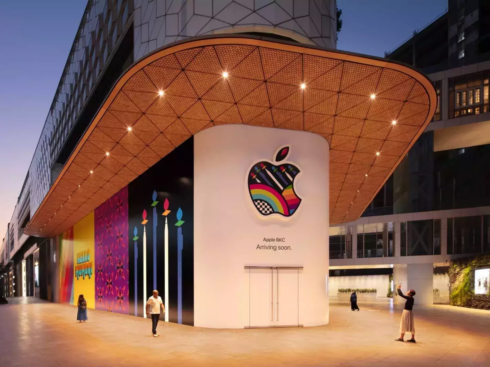SUMMARY
With Flipkart Deal, Indian Ecommerce Will Now Be Run By Walmart, Amazon, Alibaba, And SoftBank
Indian ecommerce, which started its journey along with Flipkart, recently saw the entry of global players who’re developing separate ecosystems within the segment. While US ecommerce giant Amazon is playing the field on its own, another ‘ecommerce ecosystem’ has been on the rise with SoftBank, Alibaba, and Paytm. Now, after the Flipkart-Walmart deal, another one appears to be in the making with Walmart, Tencent, and Flipkart.
Talking of Walmart’s entry into India simply from the perspective of Flipkart, its investors and employees, and even from the point of view of Indian ecommerce and its players would be shortsighted. The deal has already shaken up these stakeholders, especially the Flipkart board, which saw Sachin Bansal and many others quit and is getting ready for the entry of three-four Walmart executives. We also know that SoftBank, a major investor in Flipkart, still hasn’t taken a decision about its 22.6% stake in the company, as exiting at this point — it just acquired the stake last year — will attract hefty taxes for SoftBank.
Beyond Flipkart’s employees and investors, the entry of a retail behemoth like Walmart is bound to have far-reaching consequences on the Indian startup ecosystem as a whole and even on other industries, given Walmart’s heft in supply chain and retail. Among the points to ponder are the contrasting design philosophies of Walmart and Flipkart, besides the impact of the development on the farm-to-fork sector, supply chain, food and groceries, inventory and vendor management in India.
Then there’s is the question of Flipkart’s future — one of the possible (and eventual) outcomes of the deal is Flipkart’s merger with JD.com or a strategic collaboration between the two, given the fact that Tencent and Walmart are also significant stakeholders in Chinese ecommerce giant JD.com.
Inc42 analyses how the important stakeholders in the Indian startup ecosystem reacted to the Flipkart-Walmart deal and which aspects of the Indian startup ecosystem and industry, in general, might be impacted by the deal. Supply chain to agriculture and ecommerce, equations that the deal is bound to change.
The Lukewarm Response From The US Market And Indian Govt
Having learnt from its partnership with JD.com, in which Walmart, has no extra voting rights despite being a significant stakeholder (12%), the US retail giant this time decided to go full frontal with Flipkart, buying a 77% stake in the Indian ecommerce unicorn.
However, as the deal unfolds, it’s becoming clear that things haven’t entirely gone the Walmart way, as it was initially speculated they would. To begin with, despite NITI Aayog extending its support to the deal, Prime Minister Narendra Modi and commerce minister Suresh Prabhu cancelled their appointment with Doug McMillon, CEO of Walmart Group at the last minute, reportedly because of an ongoing bribery probe against the company in the US. Besides, the US market, prima facie, has given a lukewarm response to the deal, as Walmart lost a $10 Bn in market cap a day after the announcement.
Flipkart-Walmart: Mixed Reactions From Stakeholders
No deal is perfect, and this is true of the Flipkart-Walmart deal as well. Despite Walmart having paid a ‘premium price’ for its grand entry into the relatively small segment of ecommerce (Walmart is known for its retail business), which constitutes just 1% of the Indian retail space, some of the stakeholders exiting Flipkart, including Sachin Bansal and SoftBank, were apparently not happy; rather they seemed confused.
The mixed reactions could be seen in bits and pieces. Right after the exit, Flipkart co-founder Sachin Bansal put up a Facebook post which went: “Sadly my work here is done and after 10 years, it’s time to hand over the baton and move on from Flipkart…”
Others, like Peggy Johnson, EVP, Microsoft, received the news of the deal well. “It’s great to see the announcement of Walmart’s investment in Flipkart, India’s leading marketplace,” Peggy stated in her Linkedin Post. She added that as Flipkart’s exclusive cloud provider, Microsoft was looking forward to collaborating with both the companies to power the future of retail in India and help create great ecommerce experiences for hundreds of millions of people. As of now, Microsoft will remain a strategic stakeholder in Flipkart.
Investors, startups, and Indian startup ecosystem stakeholders at large too welcomed the deal. However, the sellers, RSS-affiliate Swadeshi Jagran Manch, the Confederation of All India Traders (CAIT), and the All India Online Vendors Association (AIOVA) have either opposed the deal or urged the Flipkart board to listen to their concerns first.
At the other end, Flipkart’s largest shareholder, SoftBank, despite getting $4 Bn against its $2.5 Bn investment made last year, hasn’t apparently revealed its cards yet. According to reports, it may swing either way.
However, these are secondary developments. The primary news remains that Walmart is set to foray into the Indian B2C market, and this will mark the beginning of a new significant chapter in the Indian startup ecosystem.
Flipkart: A Strategy Well Pulled Off?
Walmart has been trying to enter the Indian market for many many years. Acquiring Flipkart wasn’t an isolated plan, but a decision in line with Walmart’s acquisitions in China, Japan, and other countries. Many of them haven’t really worked well, but there is a definitive strategic initiative from Walmart to get into the South Asian region. Part of this plan is to acquire certain startups that could help support its global denomination plan.
The plan will work well for Flipkart as well. Just fundings weren’t enough for Flipkart to battle Amazon, which has just fuelled $5 Bn into Amazon India, betting huge on the food and agriculture market.
Both the companies, Flipkart and Walmart had held talks in late 2016 too; however, the deal didn’t go through.
In this case, along with funding, comes the huge expertise of Walmart in retail and supply chain, something Flipkart really needs if it is to take on Amazon.
Then there is the all-important fact that Walmart will allow Flipkart to continue to function without losing or diluting its brand — the board wanted Flipkart to continue to function independently along with its subsidiaries. As reported by Inc42 earlier, despite having another lucrative offer from Amazon that was green-signalled by SoftBank, Flipkart decided to go with Walmart. This was because, with an Amazon merger, there were chances that Amazon would dilute the Flipkart branding in order to promote Amazon, a Flipkart Insider told Inc42. For instance, Amazon would have merged PhonePe with Amazon Pay and even the main portal Flipkart.com with its own Amazon.in. The supply chain could have been merged as well.
Therefore, the board members, despite reportedly having a better offer from Amazon, went on with Walmart deal.
Are the Sellers’ Worries Real?
Flipkart CEO Kalyan Krishnamurthy in an email to sellers informed that Walmart was joining it as a “strategic investor and long-term partner,” but Flipkart vendors and sellers are apparently not happy with the move, suspecting Walmart of diluting their profits further.
As the battle between Flipkart and Amazon is set to become high-pitched, Walmart, which is known for its discounts, might push the sellers to provide more discounts, sellers suspect. One seller, Rahul Khullar, a member of the AIOVA tweeted, “Day of shame for both the giants, taking home big money, and giving sellers nothing, debited our INR 1 Mn by Flipkart today and didn’t even give a chance to justify.”

Sellers suspect that they will not have a voice in the entire deal, as Walmart, known for its ownership over the entire chain — from production to supply chain — might dictate the terms and conditions.
Here Comes eBay Again
Another US ecommerce biggie, eBay, which last year sold its eBay India stake to Flipkart, gaining a 6.5% stake in Flipkart (while losing some cash, of course) has announced a comeback in the Indian market by reviving its eBay India brand. After the deal, Devin Wenig, CEO of eBay, announced plans to relaunch the India brand on Twitter: “We will be back in the India market soon with http://eBay.in. We will start by bringing import inventory into India and opening up the world’s markets to Indian merchants.”
Since the acquisition of eBay India by Flipkart, sellers at eBay India had time and again complained of the Flipkart ecosystem not supporting the eBay India platform, which has almost died in the last one year.
Thus, with eBay India, one more ecommerce player set to join the Indian ecommerce bandwagon, as an immediate impact of the deal.
Flipkart, India’s Alibaba?
Eighteen years ago, when SoftBank had made an investment of $20 Mn in Alibaba, Chinese ecommerce was in a nascent age and appeared too risky to invest in. However, later, on May 8, 2014, as Alibaba opted to go for an IPO, Softbank’s 34.5% stake in the company got valued at $58 Bn, making SoftBank a more powerful investor than ever before.
India, second to China, is full of opportunities. While SoftBank still hasn’t been as lucky here as it has been in China, the Flipkart-Walmart combination has the chance to replicate Alibaba’s success.
Flipkart, which has been valued at $20.7 Bn, reportedly intends to go for an IPO in three to four years. If Flipkart-Walmart amalgamates the latter’s retail expertise with technology solutions from Flipkart developers, there is a huge chance that Flipkart’s future IPO may see success similar to what Alibaba achieved in 2014.
However, in this entire success saga, unlike Jack Ma, Sachin Bansal will be missing the ship.
The Investment Impact
“It’s good for the entire ecosystem. It will encourage people to invest. However, one of the wrong messages that people might get is that the only way to build a successful company is to bear large losses,” said K Vaitheesvaran, founder of India’s first online store, Indiaplaza
Among Flipkart’s stakeholders, Accel Partners will reportedly get almost $1.1 Bn against an investment of $100 Mn. Similarly, SoftBank might get $4 Bn against its $2.5 Bn investment made last year. Tiger Global, which is selling 17% of its stake in Flipkart to Walmart while keeping 5%, is set to get $3.3 Bn against a $1.1 Bn investment.
This is the first time in the Indian startup ecosystem that so many late-stage investors are getting huge returns on their investments.
Until before this, late-stage investors in Indian startups had hit a roadblock with almost no exit plan in the ecosystem. Dr Apoorv Ranjan Sharma, founder of Venture Catalysts, told Inc42, “The Flipkart-Walmart deal has not only consolidated the Indian ecommerce space but also boosted the confidence of new investors like SoftBank, Accel, and other investors who kept investing (in India) for a long time with no return. This finally gives the much-awaited return to these investors.”
He added this is a confidence booster for the Indian startup ecosystem. “Though not technically, but the deal is going to strengthen the entire Indian ecosystem by five times. There were times when Flipkart’s valuation continued to reduce, discouraging new entrepreneurs from joining the startup bandwagon in the country,” Apoorv added.
Most valuators, however, think that the premium price paid to Flipkart — the company has been reporting huge losses every passing year — might set a wrong example to startup entrepreneurs.
Varsha Tagare, MD, Qualcomm Ventures India, feels that the investment has come just at the right time. She told Inc42, “The deal value of Flipkart’s acquisition solidifies India’s position as one of the fastest-growing consumer Internet markets in the world. The acquisition will boost startup activity in India after two years consecutive years of decline.”
While it’s true that the deal has not only encouraged the entrepreneurs to pursue their dream stronger than before, as pointed out by Apoorv and Vaitheesvaran, the deal has also encouraged the investors very positively.
However, while Flipkart, which less than a year ago was valued at $11.6 Bn saw a rocket hike in its valuation along the deal. So, while it’s a premium price for Flipkart, as valuators, as well as Vaitheesvaran, suggest, what’s in Walmart bucket at such a premium price, given the fact that none of the Indian ecommerce companies including Amazon India could ever turn to a profitable venture?
Time is money — who knows it better than Waltons (the owners of Walmart), who had to wait for 20 years to enter the Indian market. Their thinking is based on the market loss that they have already faced for all these years. What if the Flipkart deal hadn’t happened. They would’ve had to lose further possible market gains for an uncertain period of time.
Speaking to Inc42, Abhinav Johri, global operations leader, EY, however, differed. He feels the “Walmart investment can’t be seen as a short-term one.”
Thus, even in India, where investment strategies are usually short-term — often hardly a year — due to the perpetual inventory shortage in Indian companies, for the Waltons the Flipkart investment is “keeping a decade’s design thinking in place” feels Abhinav.
While Vaitheesvaran is of the opinion that the doors to Indian ecommerce are now shut for others, Apoorv differs, “Walmart’s entry in Indian ecommerce is just the beginning. There are many large Chinese players like Alibaba, Tencent, etc that are keen to keep investing in India, including in ecommerce.” And in the next six months, we will see more acquisitions like this, he feels.
“In the next few years, India might see 10 big ecommerce startups operating successfully,” said Apoorv.
Impact of the Flipkart-Walmart deal on Industry
The sectors that will see huge changes in the next few years are supply chain management, the farm-to-fork sector, food and groceries, and inventory and vendor management, feels Abhinav. This will boost the confidence of entrepreneurs working and wanting to work in these sectors.
“Walmart is here to boost the farm-to-fork sector. This will also create a number of jobs in the country,” said Abhinav.
Farm-to-fork, for instance, despite all the buzz and exciting entrepreneurial spirit, failed to make an impact in India. Walmart will provide a much-needed push to entrepreneurs here. “Its farm-to-fork strategy will definitely have a huge impact in India. Procurement will be done at the village level. However, it remains to be seen whether the model remains limited to urban India or is it implemented in rural India as well,” said Abhinav.
He also highlighted the issues in Indian ecommerce: “While Indian ecommerce companies Flipkart and Amazon have been doing good in non-perishable goods, perishable goods, i.e. the food and groceries market, has been the most challenging part of Indian ecommerce business.”
This is exactly the gap that Walmart can fill. As per Abhinav, the food and groceries sector has been Walmart’s forte for a long time. It knows retail better than anyone else in the world, In particular, food and groceries. “Walmart will be able to get what the rest haven’t, i.e. connect the offline seamless transfer of goods with the online business. This includes cold chain, grocery centres, and warehouses,” he explained.
Supply chain is another forte of Walmart. Walmart cuts the middlemen, so the gap between production cost and selling price is very thin. Walmart makes it possible by making vendors an inherent part of the Walmart ecosystem. This will also impact the entire supply chain, making it more efficient and tech-savvy.
“What’s Amazon’s weakness is Walmart’s strength. Flipkart will act like its technology arm while entering into the world’s largest food and agriculture market of the world, with the promise of opening stores as well,” said Abhinav.
Finally, The Upcoming War: Walmart Vs Amazon
Amazon’s market cap at $776 Bn is about three times that of Walmart’s. Although the two US rivals operate in a similar space, their design thinking is poles apart. This, and the huge potential of the Indian market is why experts believe both Amazon and Flipkart are going to stay in India, despite thin operating margins.
Unlike Walmart, which is the largest retail player in the world, Amazon has remained a startup in its design thinking, ready to operate with long-term, short-term, and alternate strategies. Amazon is a technology provider at its core. Hence, the company has developed not just an e-retail ecosystem, but a number of other ecosystems as well.
Unlike Walmart, which is price aggressive in its approach, Amazon has differentiated its solutions. With Amazon Prime, it aims to cater to relatively niche markets, guaranteeing quick deliveries besides offering music, videos, and more — an offering that overlaps with Netflix’s and Hotstar’s space. Similarly, Amazon with its cloud solutions on AWS and AI-enabled solutions Alexa has sparked the tech startup ecosystem in the country.
Having developed and forayed into different spaces, Jeff Bezos, Amazon’s chief has kept technology at the top, something Walmart can’t match.
Having said that, given Walmart’s deep retail expertise, Amazon will find it very hard to compete with its US rival in India’s food and groceries segment despite being an early entrant here.
Winning in India is about tapping more and more customers, something both the companies realise as they sharpen their respective arsenals to come out tops in the long-drawn battle that is the Indian market.



























